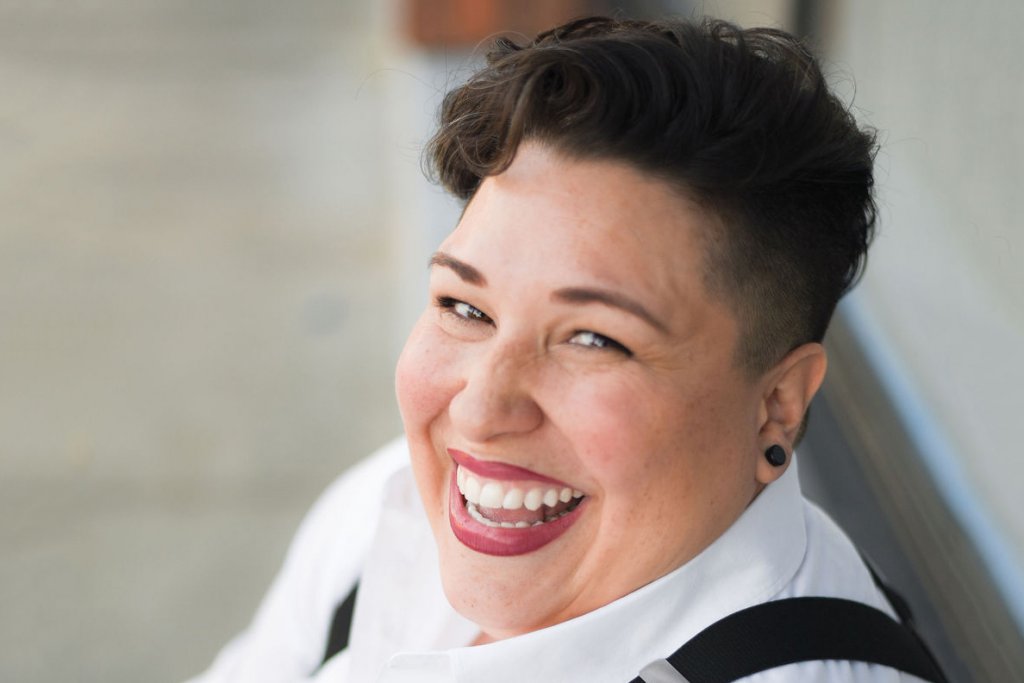Kim Mendez had been given the role of Baba the Turk, the bearded lady in Igor Stravinsky’s 1951 opera The Rake’s Progress. It just didn’t feel right. The character seemed like a mash-up of bad gay stereotypes. For Mendez – who identifies as a queer Latine fat liberationist – this was a problem.
So, Mendez went to see the opera director. Together, they reinterpreted the character. Baba’s pronouns would be changed to they/them (which are also Mendez’s pronouns). Mendez would wear a glitter beard to portray Baba as a beloved character whose gender fluid nature confuses everyone. “It gave me gender euphoria to sing this fabulous role on stage,” Mendez said.
Like their role as Baba, Mendez’s own path to UCLA has been anything but ordinary. Growing up in Chico, California, music had always been a part of their life, but it was not something they had ever considered as a career path. College was not on their horizon. Working a desk job, they began to feel as if their life was not going anywhere. Then Mendez was visited by a friend from Los Angeles, who mentioned that she needed a new roommate. Mendez put in their two-week notice that day.
“LA was intimidating,” Mendez recalled. They enrolled at Pasadena City College and then spent several years working as a costume builder. While a fascinating business, it was a grueling schedule that often left Mendez wondering if there was a more sane way to make a living. They returned to Pasadena City College, this time thinking that music therapy might be an interesting career path. Their voice teacher, Maria Fortuna Dean, was struck by Mendez’s talent, and asked Mendez if they were going to apply to transfer to UCLA to study music. Mendez said no.
“She asked me if I was crazy,” Mendez recalled, laughing.
Mendez went on to complete their bachelor of music degree at UCLA before enrolling as a master’s student in vocal performance. Among their highlights at UCLA was performing on a Grammy-winning recording with the UCLA Chamber Singers, as well as being part of the Seraphic Fire Ensemble Artists Program through their choral studies program. This gave them two opportunities to travel to Miami and sing with a professional vocal ensemble.
“The music was incredibly challenging,” said Mendez. “And the pandemic made it difficult to get together and rehearse before we traveled to Miami. So, I was really nervous. The professional singers saw that deer in the headlights look, and reassured me that it was some of the hardest music by Bach out there.”
The impact of singing with Seraphic Fire cannot be understated. “It was a life changing experience.”
A long-time champion of human rights, Mendez served on the UCLA LGBTQ+ student advocacy committee. Of particular note was their work in collaboration with the Trans Wellness Team to make sure that the Trans@UCLA website language was welcoming to all. Given the stress and strain of the pandemic, Mendez understood just how important this was.
“For a trans person, going to the doctor can be terrifying, especially for trans students who may be able to be out and receive trans care for the first time” said Mendez. “We went through the website’s language, line by line, to make sure it was specific, informative, and inclusive.” Mendez also worked on outreach to the LGBTQ+ community.
Mendez’s final master’s recital was a showcase of their vocal talent, family history, and identity. The recital was framed by a song cycle by Dylan Tran titled Elogio de Mi Cuerpo (In Celebration of My Body), with poetry by a Guatemalan feminist poet Alíde Foppa. Kim Mendez created many of the arrangements, including a mashup of the Benjamin Britten song “Funeral Blues” with William Bolcolm’s “George,” a song that adapted a poem about the murder of a trans woman. In Mendez’s arrangement, the character’s pronouns were changed to her correct ones, and her real name, Georgia, was used rather than George, her deadname (a trans person’s birthname, which is changed during gender transition).
Except in one place. “There was a point where I had to keep George because of the rhythm,” Mendez explained. “But I followed it with a line where Georgia corrects me [the singer] with her real name, the way so many trans people have to do every day. It was my own representation of the trans experience.”
Mendez looks forward to commencement. But there will be little time for rest. After graduation, they are off to the Aspen Music Festival with the Seraphic Fire Professional Choral Institute and then it will be time to gear up for the fall audition season.
